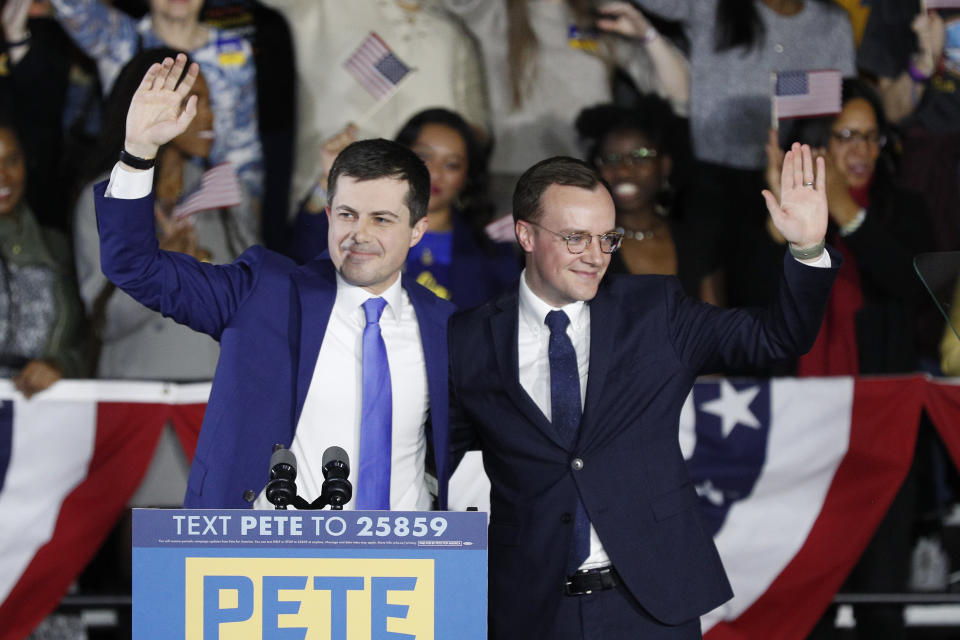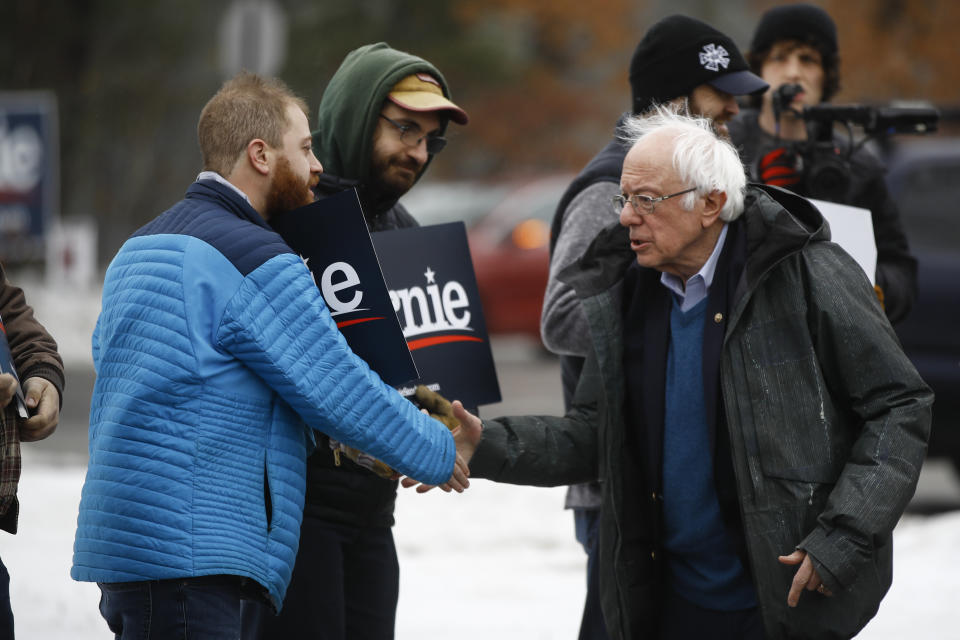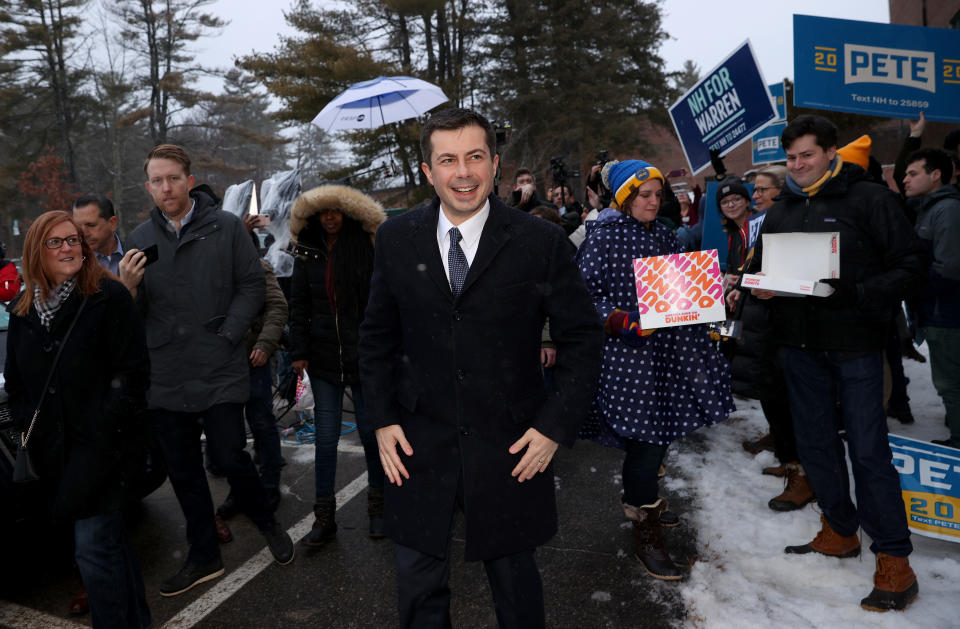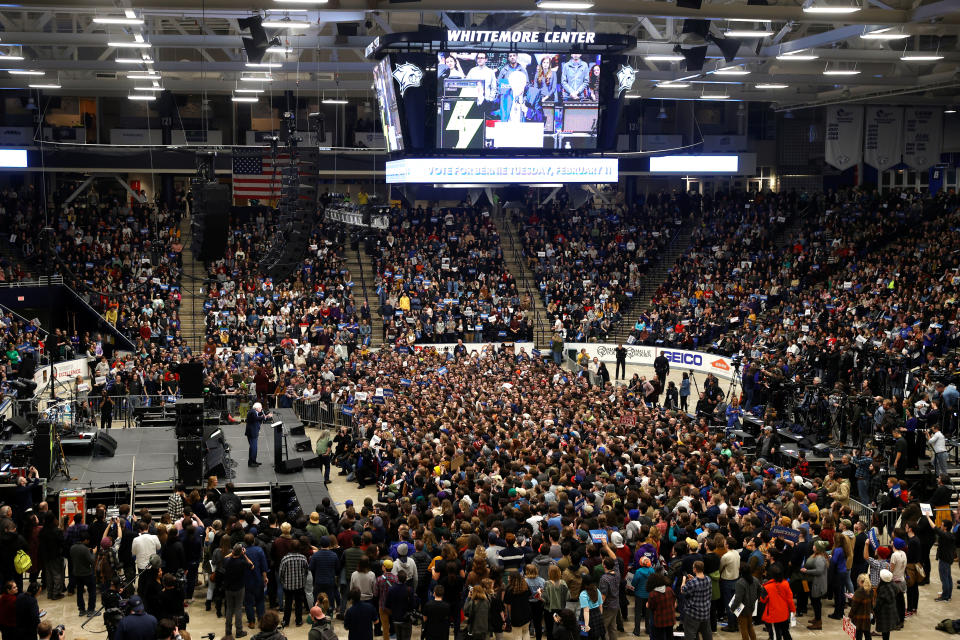Bernie Sanders looks to young voters to help him recapture the magic in New Hampshire
DURHAM, N.H. — This is the place where Bernie Sanders’s long-standing dream of a “political revolution” seemed most likely to become a reality.
Four years ago, after a close finish in Iowa, Sanders scored a resounding victory in New Hampshire’s Democratic presidential primary. The win turned the Vermont senator from a long shot to a serious contender and helped mainstream his calls for universal health care, free public education and progressive tax rates designed to address wealth inequality. This year, faced with ascendant rivals, Sanders urgently needs a repeat performance in the Granite State, and his campaign is turning to young voters to make it happen. Sanders’s campaign manager, Faiz Shakir, discussed the focus on youth in a brief conversation with Yahoo News on Monday evening.
“The reason why I feel confident is, if we are to succeed, the youth turnout needs to be very high, not only here but around the country. And that’s also, by the way, the reason why we feel we can beat Donald Trump is we can drive a huge young-person turnout,” Shakir said.
Sanders spent Monday, the night before the primary, inside a packed arena at the University of New Hampshire where, according to his campaign, more than 7,500 people gathered to see the senator and a performance by the rock band the Strokes. Amid the roar of the crowd and the swirl of a fog machine, Shakir explained that the evening was designed to send an explicit message.
“We architected this event, top to bottom, from the stage, to the artists on there, to where we are, to the speakers that you will see — they are an explicit attempt to reach out to young people and to get them energized,” Shakir said.

Relying on young voters makes sense for Sanders, who dominated the under-30 demographic in 2016. However, that wasn’t sufficient to propel him to the White House — young people do not typically turn out at the same rate as older voters. According to the nonpartisan California Civic Engagement Project at UC Davis, just about one-third of registered voters between the ages of 18 and 24 cast a vote in the 2016 primary. Shakir acknowledged that as a problem.
“The problem, to the extent that there is a problem with young people voting, is that they don’t vote, and if we can increase the percentage we will do phenomenally well,” Shakir said.
It’s an increasingly high-stakes bet for Sanders as the fortunes of some of his opponents are rising in New Hampshire, which seemed like a stronghold for the senator prior to the Iowa caucuses on Feb. 3.
Sanders headed into Iowa as a bona fide frontrunner with a clear path to victory and a lead in the polls. A clear win in Iowa likely would have propelled him to another, perhaps decisive, triumph in New Hampshire. No modern presidential candidate has lost their party’s nomination after winning both Iowa and New Hampshire. Even in the exceptionally crowded field, starting the primary with back-to-back victories would have given Sanders momentum for the later contests in the West.
But Sanders wasn’t able to leave Iowa a clear winner. He won the popular vote, after a series of issues with calculating the results, but came in a fraction of a percentage point behind former South Bend, Ind., Mayor Pete Buttigieg in the state delegate totals. Due to the widespread problems with the reporting of results, both the Sanders and Buttigieg campaigns have requested recanvasses of specific precincts. But for now the picture is muddled.

As the frontrunner, Sanders was expected to win in Iowa. Buttigieg, who was a relative unknown before entering the presidential race and had been polling fourth in Iowa, is a different story. His surprisingly strong showing resulted in a surge of donations and media attention, and moved him up in the polls in New Hampshire, where he has gained an average of about 7 points since the Iowa caucuses and is now a close second to Sanders.
According to a source, the Sanders campaign has internal numbers showing the senator with a solid base of support that could net him more than a quarter of the vote in New Hampshire. But those numbers also show a wide range of possible outcomes for Buttigieg — including potentially coming in first place.
Along with youth turnout, the Sanders campaign is hoping to stay on top thanks to an army of volunteers who have flooded New Hampshire in recent days. Sanders noted this effort when he spoke to some of these supporters outside a field office in the town of Hudson on Monday, hours before his climactic concert.
“Here in New Hampshire, I am told by our campaign director … that on Saturday, one day, we knocked — our people, you — knocked on 20 percent of the doors in the state of New Hampshire in one day,” Sanders said. “That’s how we win elections.”
Sanders framed the effort as part of a nationwide “grassroots movement” supporting his campaign.

Sanders’s campaign is emphasizing clear distinctions between his progressive platform and Buttigieg’s more moderate approaches to health care, student debt and tax reform. Shakir, Sanders’s campaign manager, insisted he’s “not worried” about a surge for Buttigieg.
“With Pete, we feel like the distinctions between them are very clear,” Shakir said. “You’ve got a corporate-funded Democrat who believes that you want to cut deals with special interests and, on the other hand, a grassroots-funded candidate who will stand up and has stood up to special interests his entire life. You decide.”
Sanders himself similarly attacked Buttigieg for taking donations from “the billionaire class” as he addressed volunteers on a loading dock outside a field office in Hudson on Monday afternoon.
“There are some people who say, you know, ‘It doesn’t matter … a dollar is a dollar.’ That’s wrong,” Sanders said, adding, “You know and I know, and conservatives and progressives know … that the fundamental problem in this country is the power that the billionaire class has over the economic and political life of this country.”
Buttigieg has responded to the attacks by pointing out that he, personally, is much less affluent than Sanders, whose net worth is as high as $2 million, largely from book royalties.
“Bernie’s pretty rich, and I would happily accept a contribution from him,” Buttigieg said in an appearance on CNN Sunday.
Buttigieg’s campaign expressed confidence heading into the primary. However, it also tempered expectations by noting Sanders’s past performance in the state and the fact that Sanders and another candidate, Sen. Elizabeth Warren of Massachusetts, are both from the region.

“Pete is running competitive heading into Tuesday night in a race that includes two senators from neighboring states — one of which won the primary by 20 points last cycle,” a Buttigieg campaign source said, adding, “We’ve seen some of our largest crowds to date in the closing days.”
Indeed, another surging centrist may be stealing some of Buttigieg’s momentum. At least part of his rise is likely due to the falling fortunes of former Vice President Joe Biden, who came in a surprising fourth place in the disputed Iowa results. And as Biden has waned, Buttigieg isn’t the only one picking up steam. Polls show that Minnesota Sen. Amy Klobuchar has gained an average of about 5 points since the Iowa caucuses. Her growth could be a boon to Sanders that could help keep Buttigieg at the lower end of the wide range the Sanders campaign has predicted for him in New Hampshire.
But rather than depending on the performance of other campaigns, Sanders’s team seems confident in his bet on young people. As incense and fog wafted around the packed arena in Durham, Shakir surveyed the scene with a satisfied smile.
“As I look around this room, I feel a great sense of mission accomplished on our campaign’s part,” Shakir said. “Because you see here, like an hour before Bernie speaks, it’s filled to the brim with young people, and that’s exactly what we wanted.”
Indeed, at one point there was almost too much youthful energy in the room. As the Strokes played, some members of the audience surfed on top of the crowd, which was pressing forward against a barricade near the stage. Several Sanders staffers rushed forward in an effort to fish out the surfers and hold up the barricade to keep rally-goers from being injured. The campaign staff ended up pulling the barricades up onto the stage and letting the crowd surge forward. For at least one night, Sanders’s young supporters could not be held back.

_____
Read more from Yahoo News:



